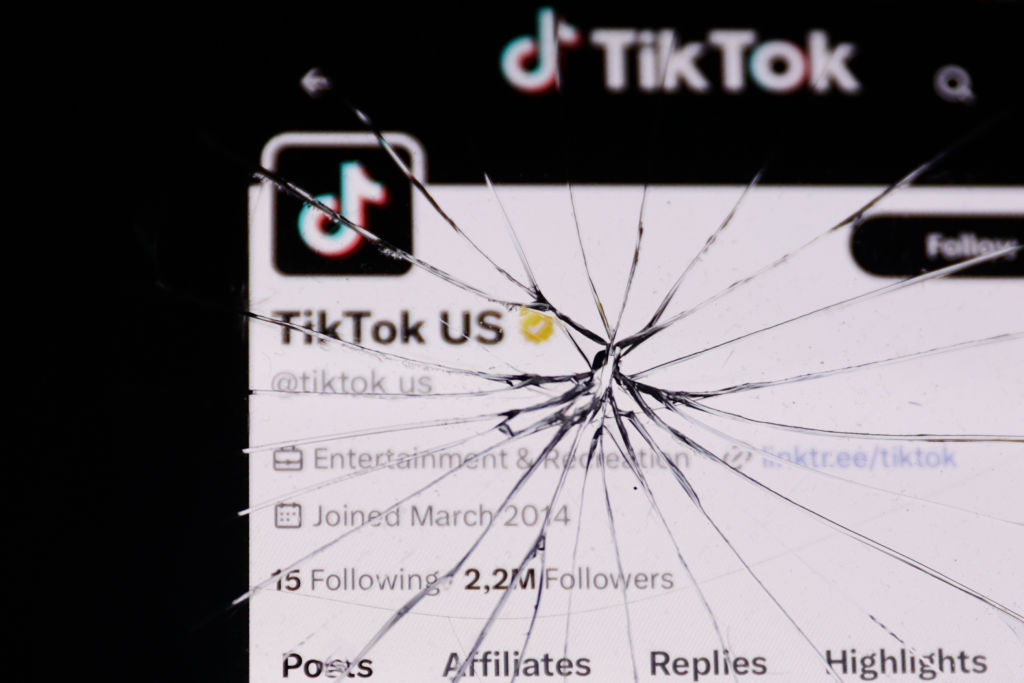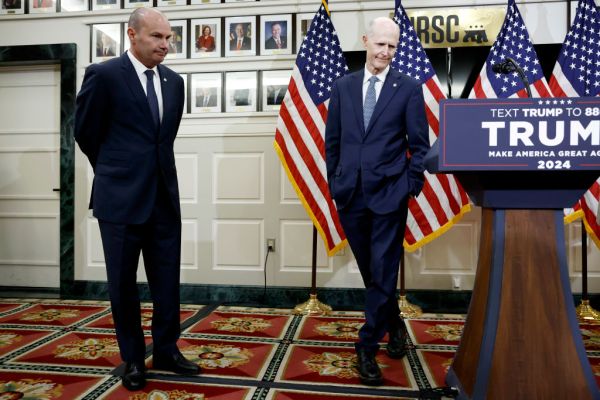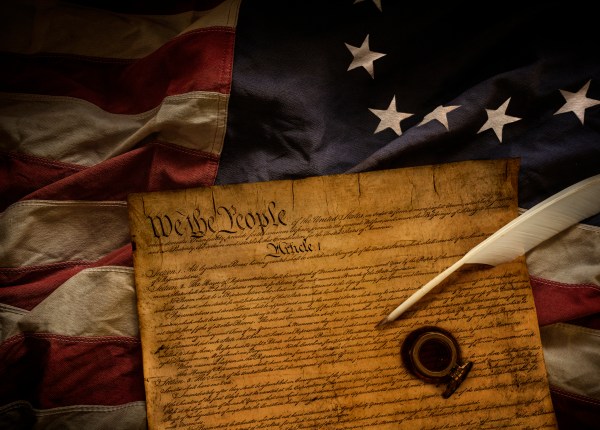Happy Thursday! There’s cool, and then there’s a middle schooler casually destroying a sitting U.S. senator at chess on his home turf.
Quick Hits: Today’s Top Stories
- In a rare primetime interview with CNN on Wednesday, President Joe Biden said—citing concern for Palestinian civilians—that his administration would halt some weapons shipments to Israel if Israeli Prime Minister Benjamin Netanyahu launched a major invasion into the southern Gaza city of Rafah. The president said the U.S. would continue to support Israel’s defense—providing munitions for the Iron Dome air defense system, for example—but claimed that U.S.-supplied bombs had killed civilians in the enclave during Israel’s war against Hamas. “Civilians have been killed in Gaza as a consequence of those bombs and other ways in which they go after population centers,” Biden told CNN’s Erin Burnett. “I made it clear that if they go into Rafah—they haven’t gone in Rafah yet—if they go into Rafah, I’m not supplying the weapons that have been used historically to deal with Rafah, to deal with the cities—that deal with that problem.” Earlier Wednesday, Secretary of Defense Lloyd Austin confirmed the administration had already paused a shipment of “high-payload” munitions after Israel’s initial incursion into Rafah this week.
- European Union (EU) ambassadors reached a tentative agreement on Wednesday to use windfall profits from frozen Russian assets to support Ukraine’s military. The measure will now go to EU member nations’ governments for final approval, which would open more than $3 billion a year for Ukraine’s defense against Russia’s invasion, with the first installment anticipated as early as July.
- The United Kingdom on Wednesday expelled a Russian diplomat for acting as an “undeclared Russian military intelligence officer,” according to U.K. Home Secretary James Cleverly. “Russia think[s] they can divide Europe through continued hostile action,” Cleverly said. “They are wrong.” The expulsion comes after German authorities in April arrested six people—including several with links to the right-wing Alternative for Deutschland party—for allegedly spying for Russia and China.
- The Georgia Court of Appeals agreed on Wednesday to hear an appeal from Donald Trump’s legal team of the decision allowing Fulton County District Attorney Fani Willis to remain the prosecutor in her racketeering case against the former president and others accused of attempting to overturn the results of the 2020 election in the state. Willis faced scrutiny earlier this year over a romantic relationship with a special prosecutor, Nathan Wade, whom she hired to work on the case. Fulton County Superior Court Judge Scott McAfee ruled in March that Willis could remain on the case only if Wade resigned from the prosecution team, which he did. The state court’s decision to take up the appeal indefinitely delays the beginning of that trial, potentially pushing it into 2025, regardless of the appeal’s outcome.
- A motion to oust House Speaker Mike Johnson failed by a vote of 359-43 Wednesday, with 163 Democrats joining 196 Republicans to table the measure brought to the floor by Republican Rep. Marjorie Taylor Greene of Georgia. Just 32 Democratic representatives voted with 11 Republicans to oust Johnson after he successfully shepherded a bipartisan national security package that included aid for Ukraine through the House last month.
- Lawyers for the defunct cryptocurrency exchange FTX said on Tuesday that people who used the bankrupt exchange will be reimbursed for the full amount of money they lost when the company collapsed in 2022, plus interest. The company’s lawyers said it had around $14.5 to $16.3 billion collected from pooled assets, which could be sent as cash payments to former exchange users in the next several weeks. In March, FTX founder Sam Bankman Fried was sentenced to 25 years in prison for defrauding customers of the exchange.
- Metropolitan Police in Washington, D.C., cleared the anti-Israel encampment on George Washington University’s campus overnight Tuesday, arresting 33 protesters. Mayor Muriel Bowser had been scheduled to give testimony about the demonstrations before a House panel on Wednesday, but the hearing was scrapped once police dismantled the encampment.
TikTok Fires Back

Despite being under fire for the potential national security risk it could pose because of its connections to the Chinese Communist Party, U.S. politicians can’t seem to resist the lure of TikTok and the hundreds of thousands of young voters taken in by the video-sharing app.
President Joe Biden’s campaign joined the platform in February, just weeks before he signed a bill into law that could eventually ban it from app stores in the U.S. Former President Donald Trump’s super PAC—officially unaffiliated with the man himself, who’s flip-flopped on whether TikTok should be banned—joined in the fun on Wednesday under the handle “@MAGA.”
Here at TMD, we think that if TikTok is going out, it should go out with a bang: with videos of the two elderly presidential candidates doing the latest viral TikTok dance, ideally together. It’s what America deserves.
TikTok and its parent company ByteDance sued the government this week arguing the legislation Biden signed into law—which includes provisions requiring TikTok’s parent company, ByteDance, to divest from TikTok in the U.S. or face a ban of the popular video-sharing app—is unconstitutional. TikTok’s lawyers raised First Amendment concerns in their lawsuit filed with the U.S. Court of Appeals for the D.C. Circuit, which will be tasked with weighing those concerns against the app’s potential national security risks.
The bipartisan national security and foreign aid package that Biden signed late last month included the Protecting Americans From Foreign Adversary Controlled Applications Act, which gives ByteDance 270 days to divest its ownership stake from TikTok. If it fails to do so, Congress will enforce a ban by threatening a penalty against the application, as well as vendors like app stores and website hosts that work with the app. In TikTok’s case, the penalty—$5,000 multiplied by the number of U.S. users of the violating app—would add up to somewhere in the neighborhood of expected 2024 U.S. defense spending.
The bill specifically names both ByteDance and its subsidiary as unacceptable owners. But it also includes the potential to force divestment for other technology and social media companies that are “controlled by a foreign adversary”—meaning China, Russia, Iran, or North Korea—or that the president determines “present a significant threat to the national security of the United States.” The bill itself does not condition divestment on the speech produced on the application or website, but rather on control and ownership of the website or app.
Proponents of the bill argue that through ByteDance, TikTok is inextricably intertwined with the Chinese Communist Party (CCP), which makes the country’s tech companies subject to its sweeping national security laws that require them to turn over data on demand. “I have very significant security concerns about TikTok,” FBI Director Christopher Wray told Congress in January. “It’s a combination of the ability that the Chinese government would have, if they should choose to exercise it, to control the collection of the data, to control the recommendation algorithm, and if they wanted to, to be able to control and compromise devices.”
While there’s no definitive public evidence that the CCP is meddling with the algorithm that surfaces content on the app, there are some strong suggestions that might be the case—including the fact that topics typically suppressed in China are less likely to show up on TikTok in the U.S. Reporting from Rest of World suggests that the line between U.S. TikTok and Chinese ByteDance is porous at best, with employees saying “many key strategic and personnel decisions at TikTok come from ByteDance executives,” and not from TikTok’s CEO Shou Chew—despite Chew’s assurances to Congress. Democratic Rep. Raja Krishnamoorthi of Illinois, one of the bill’s co-sponsors and the ranking member of the House Select Committee on the Chinese Communist Party, told The Dispatch’s David Drucker and John McCormack that information he learned in classified intelligence briefings shored up his commitment to the bill.
The bill that ultimately became law was the result of months of secret negotiations, as Drucker and McCormack reported last week. It was also a bipartisan effort, shepherded to passage by Krishnamoorthi and former GOP Rep. Mike Gallagher of Wisconsin, who was the chair of the CCP select committee but recently retired from the House and reportedly took a job at Palantir Technologies. “Behind the scenes,” Drucker and McCormack wrote, “House Republicans were negotiating with the White House and engaging with the Department of Justice on how to draft a bill that could withstand challenges in court.”
But TikTok’s lawsuit filed Tuesday—which claims the law violates the First Amendment’s freedom of expression provisions and the Fifth Amendment’s due process guarantees—will stress test the work of those stakeholders. The divest-or-ban provision, TikTok’s lawyers argue, also violates the Constitution’s prohibition on bills of attainder—laws that declare a party guilty of a crime without a trial.
The complaint suggests that the law shouldn’t be understood as forcing divestment but rather as a de facto ban—key to making the First Amendment argument. “Banning TikTok is so obviously unconstitutional,” TikTok’s lawyers write in the filing, “that even the Act’s sponsors recognized that reality, and therefore have tried mightily to depict the law not as a ban at all, but merely a regulation of TikTok’s ownership.”
Divestment is not, TikTok’s lawyers say, “commercially, technologically, or legally feasible.” They suggest that severing the U.S. version of the app from its global users would rob TikTok of its value to the consumer, and retraining new engineers to work on the immense source code to maintain and update the app would be functionally impossible. Even still, former Treasury Secretary Steve Mnuchin reiterated Wednesday he was interested in buying and reengineering the app.
But TikTok’s lawyers also laid out another factor that might make TikTok’s potential sale to a new owner difficult: The CCP said, “No way.”
“The Chinese government has made clear that it would not permit a divestment of the recommendation engine that is a key to the success of TikTok in the United States,” the filing said, likening the Chinese government’s decision to U.S. export controls. The U.S. does limit exports on some sensitive technologies, such as computer chips that power artificial intelligence—which the suit implies are analogous to the TikTok recommendation algorithm—or dual-use tech that could be used for both benign and military ends, including for building missiles or nuclear weapons.
But that fact may be irrelevant. “It’s true that America has export controls, but this is America,” said Alan Rozenshtein, an associate professor at the University of Minnesota Law School and a former Justice Department lawyer who worked on cybersecurity and foreign intelligence issues. “The courts aren’t going to care. America is allowed to do things that are in America’s interests. That’s just how it works.”
Some analysts TMD spoke to, including Rozenshtein, see TikTok’s admission that the CCP doesn’t want to part with the algorithm as TikTok saying the quiet part out loud. “The issue is TikTok was swearing for years that there was no issue of CCP control or influence with TikTok,” said Michael Sobolik, a senior fellow in Indo-Pacific studies at the American Foreign Policy Council and a proponent of the law. “And now suddenly, by TikTok’s own admission, in its own legal brief, it is an issue—and this shouldn’t surprise anybody who’s been following the national security threat that the app poses.”
But it may be possible to over-index the Chinese government’s involvement in TikTok’s U.S. legal travails. Anupam Chander, a Georgetown law professor focused on the global regulation of new technologies, questioned what might happen if the situation were reversed and China told Apple, for example, “You’d better turn the keys over to a Chinese company, and the U.S. government intervened to block that as an export control.”
“Would that prove that Apple was really a vehicle for the U.S. government’s policies?” he asked. “No, it wouldn’t. The U.S. would be responding to protect one of its companies operating overseas, which is what the U.S. does all the time.”
The D.C. appellate court—and likely ultimately the Supreme Court—will have to decide whether the national security concerns outweigh the First Amendment implications of potentially banning a platform that serves as a venue for speech for 170 million Americans. After Montana’s legislature last year tried to ban the app for users in the state, the U.S. District Court for the District of Montana cried foul, holding that the ban overstepped the state’s authority and “likely violates the First Amendment,” though the state’s attorney general is appealing that ruling.
The Foundation for Individual Rights and Expression, a free-speech advocacy group, argued the powers the law grants to the president are too expansive, allowing the government to potentially shut down speech platforms with what it argued could be “only weak connections to foreign entities.”
The complaint emphasized the government’s burden to prove it had a legally “compelling interest” in curtailing speech. “Before you can take away a massive platform for people to communicate,” Chander said, “your reasons have to be incredibly persuasive.” TikTok’s lawyers argued in the company’s suit that the government had so far presented insufficient public evidence of an immediate threat to justify suppressing speech.
But Sobolik says TikTok is “a loaded gun” pointed at American national security. “Just because it hasn’t gone off,” he told TMD, “ doesn’t mean it’s not an issue.”
Worth Your Time
- It’s one thing to go into business with a friend, but what about competing for business with a spouse? In the Wall Street Journal, Beth DeCarbo recalled her parents’ next-door, competing hardware stores. “People are usually puzzled when I tell them that my parents owned side-by-side hardware stores (and that they were married),” she wrote. “But even though they sold some of the same merchandise, the stores were markedly different. … I look back now, and I can see that those trips across the parking lot weren’t just from one store to another. That parking lot divided two completely different worlds, with my mom and dad acting as sole sovereigns. They were a window into two different ways of doing business, of relating to people, of approaching life.”
- Modern Monetary Theory (MMT)—the economic theory that government spending should not be restrained by fears of debt—may be catching on in some circles even as it’s declining in others. That’s dangerous, Noah Smith argued in his Noahpinion Substack. “Ever since inflation exploded back into the national consciousness in 2021, the notion that fiscal deficits can allow a nation to live without limits has seemed dangerous and even kooky,” he wrote. “Ultimately, MMT as a movement doesn’t really matter—the econ journalism world will eventually shun them, just as Bernie Sanders and AOC both did after some initial flirtations. But the idea that they promulgate and represent—that deficit spending doesn’t really cost the taxpayer anything—has taken on a life of its own. Is this fine? Of course everyone wants to think we can get something for nothing. … But it’s just not correct—the government does have constraints on how much it can borrow. The MMT people, to the degree that they even have concrete ideas as opposed to poorly defined memetic verbiage, are wrong.”
Presented Without Comment
Associated Press: Biden Says U.S. Won’t Supply Weapons for Israel to Attack Rafah, in Warning to Ally
Biden signed off on the pause in an order conveyed last week to the Pentagon, according to U.S. officials who were not authorized to comment on the matter. The White House National Security Council sought to keep the decision out of the public eye for several days until it had a better understanding of the scope of Israel’s intensified military operations in Rafah and until Biden could deliver a long-planned speech on Tuesday to mark Holocaust Remembrance Day.
Also Presented Without Comment
New York Times: R.F.K. Jr. Says Doctors Found a Dead Worm in His Brain
In the Zeitgeist
We promise we’re not getting any money from Netflix to promote their live content—Netflix, if you’re reading this, give us a call—but this is a PSA: There are only two episodes left of John Mulaney Presents: Everybody’s in L.A., the live show Mulaney’s hosting each night this week with appearances by basically everyone in comedy.
Toeing the Company Line
- In the newsletters: The Dispatch Politics crew reported on the Biden campaign’s efforts to target swing-state minority voters, Scott outlined (🔒) how protectionist policies inflate food prices, Jonah decried (🔒) America’s descent into abnormality, and Nick argued (🔒) that Trump getting out of the criminal charges against him would undermine faith in the justice system.
- On the podcasts: Sarah and David are joined by Judge Kevin Newsom on Advisory Opinions to discuss the balance of power between the three branches of government.
- On the site: Drucker explores Trump’s rhetorical evolution from lamenting to praising January 6 and former Sen. Rob Portman unpacks the provision in the Ukraine aid package requiring the Biden administration to develop a strategy for the conflict.
Let Us Know
Does TikTok have a legitimate case against the law forcing a divestment? Is Chander’s hypothetical involving Apple and China a fair comparison?










Please note that we at The Dispatch hold ourselves, our work, and our commenters to a higher standard than other places on the internet. We welcome comments that foster genuine debate or discussion—including comments critical of us or our work—but responses that include ad hominem attacks on fellow Dispatch members or are intended to stoke fear and anger may be moderated.